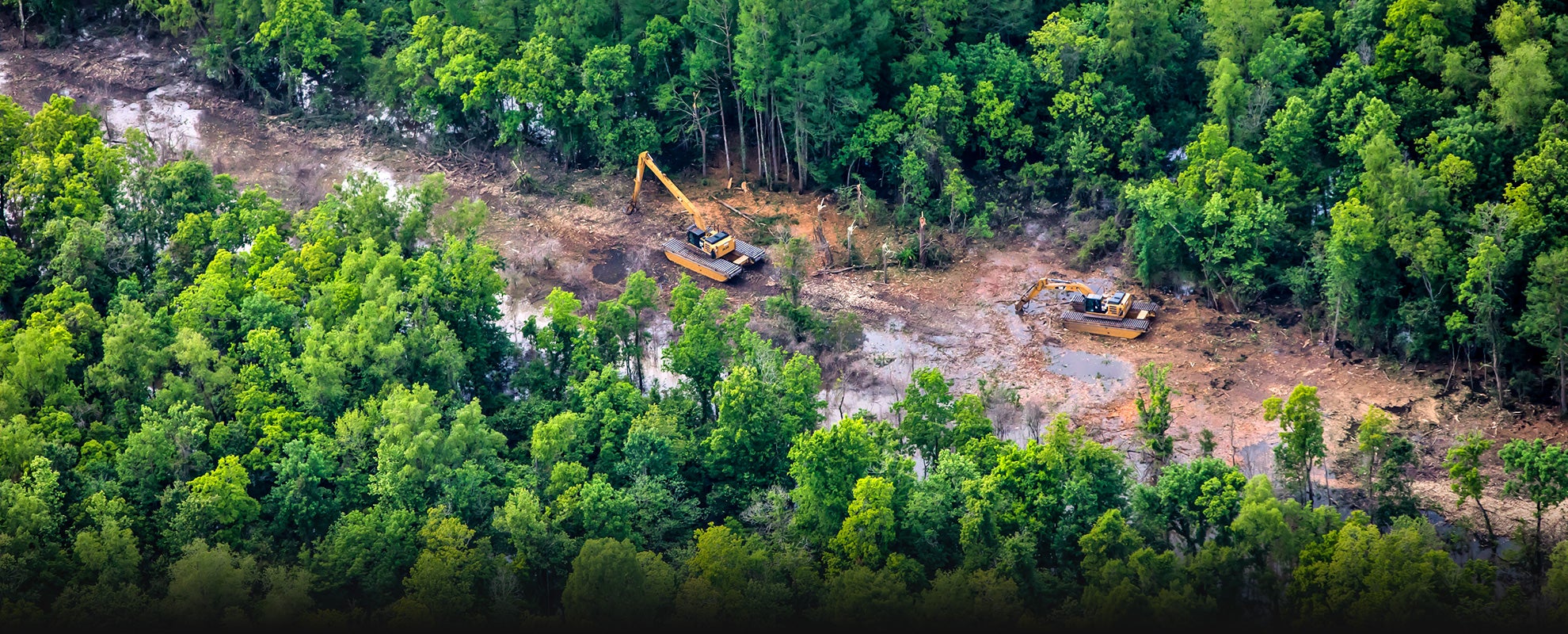Federal Appeals Court Overturns Bayou Bridge Pipeline Injunction
Construction to continue in the Atchafalaya Basin while lawsuit proceeds
Contact
Today, a three-judge panel of the U.S. Court of Appeals for the Fifth Circuit overturned an order halting construction of the controversial Bayou Bridge pipeline in the Atchafalaya River Basin. The ruling reverses U.S. District Court Judge Shelly Dick’s February order granting a preliminary injunction to halt construction on the portion of the Bayou Bridge pipeline that crosses the Atchafalaya Basin, a National Heritage Area famous for Louisiana crawfish production.
The decision allows construction of the pipeline to proceed in the Atchafalaya Basin while the underlying case is decided on the merits. Today’s 2-1 ruling follows an earlier 2-1 ruling from the Fifth Circuit, based in New Orleans, which temporarily lifted the injunction while the appeal proceeded. Immediately following this decision in March, Bayou Bridge Pipeline, LLC, a partnership between Energy Transfer Partners and Phillips 66, aggressively resumed cutting down trees in the Basin to clear the 162-mile pipeline route despite high water conditions.
“We are disappointed in the decision, but the fight to protect the Atchafalaya from risky and harmful crude oil pipelines will continue,” said Jan Hasselman with Earthjustice, who is lead counsel for the crawfishing and conservation groups who brought the lawsuit. “It is time for the oil industry to stop treating this special place — and the many people who rely on it for their livelihoods — as a national sacrifice area.”
Much of today’s 22-page ruling defended the decision by the U.S. Army Corps of Engineers (Corps) to mitigate the destruction of heritage cypress tupelo swamps during the pipeline’s construction with young trees of another type — a decision that ultimately fails to account for lost wetland function in the Basin, including flood protection benefits, as argued by the plaintiffs. In addition, the majority (Judges Edith Hollan Jones and James E. Graves, Jr.), also found that the pipeline project would have “no incremental impact” on the Atchafalaya Basin.
In stark contrast, the dissent by Judge Thomas Morrow Reavley found that the Corps’ rationale was “conspicuously silent” regarding the adequacy of the out-of-kind mitigation. In addition, Judge Reavley described Corps’ determination as “detailing the hundreds of acres of shredded wetlands[.]”
The District Court still must consider the merits of the underlying lawsuit filed by several groups — Atchafalaya Basinkeeper, the Louisiana Crawfish Producers Association – West, Gulf Restoration Network, Waterkeeper Alliance and Sierra Club, represented by Earthjustice — in January 2018. In February, Judge Dick granted the preliminary injunction halting construction in the Atchafalaya Basin, finding that construction of the pipeline would cause grave ecological damage to the Atchafalaya Basin. Currently, Bayou Bridge Pipeline, LLC, estimates that construction will be completed by October, which will likely be before a final decision in the lawsuit has been reached. If the court eventually finds in favor of the plaintiffs, shutting down the pipeline could be an option.
“There is a major legal cloud over this project, and additional construction before the lawsuit is completed is a risky gamble for this company,” said Cyn Sarthou, executive director of Gulf Restoration Network. “This injunction fight is just the first round of this fight, and we’re just getting started.”
Beyond the irreparable harm caused by pipeline construction in the Basin, opponents also have raised concerns over the impacts that construction will have on the Basin’s ability to manage floodwaters.
“With little to no enforcement from the Corps, pipeline companies have already devastated our coast and our Atchafalaya Basin, destroying some of the most amazing ecosystems on Earth, putting millions of people at greater risk of flooding and making countless coastal communities uninhabitable by humans,” said Dean Wilson, executive director of Atchafalaya Basinkeeper. “We will continue to fight for our children’s future and to stop and reverse decades of unrestricted destruction.”
“The Fifth Circuit’s decision today has implications beyond Bayou Bridge,” said Larissa Liebmann, staff attorney at Waterkeeper Alliance. “It is fundamentally unfair and illogical for courts to allow pipeline construction, and the destruction that comes with it, to go forward without first looking at whether the pipeline was properly permitted in the first place.”
The proposed Bayou Bridge pipeline project would connect the controversial Dakota Access pipeline to refineries and export terminals in St. James, Louisiana, and traverse 11 parishes and more than 700 bodies of water.
“The Bayou Bridge pipeline would pose an unacceptable risk to the wetlands, water, and communities along its route, and should never be built,” said Julie Rosenzweig, director of the Sierra Club Delta Chapter. “Allowing a company with as egregious a track record as Energy Transfer Partners to move forward with construction in spite of ongoing legal challenges is unconscionable. We will continue making our case against this dirty, dangerous pipeline.”

Additional Resources
About Earthjustice
Earthjustice is the premier nonprofit environmental law organization. We wield the power of law and the strength of partnership to protect people's health, to preserve magnificent places and wildlife, to advance clean energy, and to combat climate change. We are here because the earth needs a good lawyer.